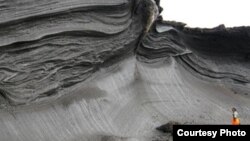Thawing permafrost, especially in the northern hemisphere, could send huge amounts of heat-trapping gases into the atmosphere by the end of this century, according to a U.N. Environment Program report released today at international climate talks in Doha, Qatar.
The report's authors say air temperatures in the world's arctic and alpine regions are expected to increase at roughly twice the global rate. These regional greenhouse gas emissions could ultimately account for up to 39 percent of total planet-wide emissions, says lead author Kevin Schaefer, from the University of Colorado’s Snow and Ice Data Center.
“The release of carbon dioxide and methane from warming permafrost is irreversible. Once the organic matter thaws and decays away, there is no way to put it back into the atmosphere,” he added.
Warming can radically alter ecosystems and cause costly damage or even destroy buildings, roads, pipelines, railways and power lines. The report recommends a special commission to study permafrost emissions, the creation of a national permafrost monitoring network and the development of a plan for adaptation for nations at greatest risk.
Delegates in Doha are meeting to craft a new international climate agreement after the 1997 Kyoto treaty expires next month. As they seek to establish new targets for emission reductions to combat global warming, the new U.N. report urges them to factor in the rapidly melting permafrost.
The report's authors say air temperatures in the world's arctic and alpine regions are expected to increase at roughly twice the global rate. These regional greenhouse gas emissions could ultimately account for up to 39 percent of total planet-wide emissions, says lead author Kevin Schaefer, from the University of Colorado’s Snow and Ice Data Center.
“The release of carbon dioxide and methane from warming permafrost is irreversible. Once the organic matter thaws and decays away, there is no way to put it back into the atmosphere,” he added.
Warming can radically alter ecosystems and cause costly damage or even destroy buildings, roads, pipelines, railways and power lines. The report recommends a special commission to study permafrost emissions, the creation of a national permafrost monitoring network and the development of a plan for adaptation for nations at greatest risk.
Delegates in Doha are meeting to craft a new international climate agreement after the 1997 Kyoto treaty expires next month. As they seek to establish new targets for emission reductions to combat global warming, the new U.N. report urges them to factor in the rapidly melting permafrost.





